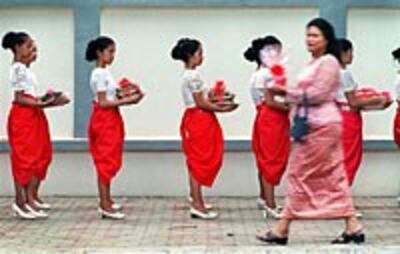
TAIPEI—Cambodian women who move to Taiwan as brides in arranged marriages often suffer beatings, social isolation, and abuse, according to Khmer women here and a Cambodian Buddhist monk who works to help them.
Venerable Yong Theng, founder of the Khmer Culture Buddhist Center in Taiwan, said his group provides interpreting for abuse victims in cooperation with Taiwan’s Ministry of the Interior.
“The majority of problems involve women being beaten by their husbands and having nobody to help file complaints with the police,” Yong Theng told RFA’s Khmer service. Some beatings are severe and result in mental distress, he added.
Yong Theng said he was once brought by police to speak to two Cambodian women in a psychiatric hospital and found them “singing noisily and banging doors and windows.”
“And when they slept, they did not sleep on the bed but underneath the bed…They told me they dreamed about being killed, beaten, and that they saw ghosts in their dreams and that they shouted out for help.”
My family was poor, and I heard that other people who came to Taiwan could help their families...[My husband] brought me to work in the house. He didn’t marry me to be his wife. He brought me here just to produce children for him.
The women became “excited and happy” when he spoke to them in Khmer and when they saw his Buddhist robes, Yong Theng said. “They said that they wanted to become nuns and stay with me at my center.”
Social isolation, enforced by Taiwanese husbands and in-laws, increases the misery of Cambodian victims of domestic abuse, Yong Theng added.
“[Many of these women] are not allowed to talk on the phone with other Cambodian women,” Yong Theng said. “Some who want to visit their friends are not allowed into their friends’ homes if husbands or relatives are there.”
Poverty in their own country drives Cambodian women to look for foreign husbands, a Cambodian woman living in Taiwan said.
Poverty drives marriage abroad
“My family was poor, and I heard that other people who came to Taiwan could help their families,” the 23-year-old woman, who asked to be identified as Anna, said. “So I decided to go to Taiwan in the hope that at least I would have some money to help my parents.”
Following what she called an “artificial wedding,” Anna said, she and her husband were happy for the first three months of their marriage. Then, she said, her husband began to drink and find fault with her. He also beat her and destroyed household items, she said.
“He brought me to work in the house,” Anna said her husband told her. “He didn’t marry me to be his wife. He brought me here just to produce children for him.”
And when they slept, they did not sleep on the bed but underneath the bed.
A Cambodian woman called Y Sayhon, who came to Taiwan in 2001, said she too suffered beatings by her husband. “He banned me from making friends with other Cambodians,” she said. “When I beg him to allow me to go out with friends, he gets angry, because he doesn’t want me to have friends. He fears that I may run away or divorce him.”
Speaking with RFA’s Cantonese service, Taiwan Ministry of the Interior officials who asked not to be named said the Ministry has published books on preventing home violence in the Chinese, English, Indonesian, Thai, and Vietnamese languages.
The Ministry has also published a “guide” in the Cambodian language, Khmer, for foreign spouses living in Taiwan, they said.
Not all are trafficked
A precise count of the Cambodian women brought to Taiwan as brides is “hard to come by,” said Wenchi Yu Perkins, director of the Anti-Trafficking and Human Rights Program of the Washington-based Vital Voices Global Partnership.
These women should not necessarily be classed as trafficking victims, though, she said.
“A lot of them find they are marrying Chinese husbands who are completely different [from what they have been led to expect],” Perkins said. “For example, their educational background might be different, their social/economic status might be different, and everything might be different.”
It is when such women are held in harsh circumstances against their will that they become victims, Perkins said. “It’s force, fraud, or coercion that defines whether something is trafficking or not.”
Original reporting by Borin Sam of RFA’s Khmer service. Additional reporting by RFA’s Cantonese service. Khmer service director: Kem Sos. Cantonese service director: Shiny Li. Translations by Sothea Thai and Luisetta Mudie. Written in English with additional reporting by Richard Finney. Edited for the Web by Sarah Jackson-Han.
